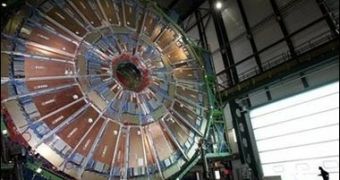Only a week after it had been started, LHC, world's biggest particle smasher, had to be stopped on Wednesday because of an electrical fault, as CERN officially announces.
The recent failures of the LHC staff haven't even been forgotten yet, and a new one comes to increase the world's doubts related to the functioning and the outcome of this whole universe-understanding event. At this level of experiment magnitude, device dimensions and international scientists' implication, failures should not be an option. The people involved – some of the smartest in the world, as they say, at least in the fields associated to the endeavor – should have everything covered, fixed and prepared before launching any test. But it seems this is not the case.
Within just a few hours from its famous launch, the 30-ton transformer that had to keep LHC cool (below 2 degrees Kelvin, near absolute zero, about -271 degrees Celsius or -456.25 degrees Fahrenheit) broke, and the temperature went up from below 2 to 4.5 Kelvin. This is unbelievably cold by any standard, even colder than the outer space, but still too warm for the accelerator to function properly. This unimaginable temperature allows electrical currents to overcome resistance, which makes electro-magnet powering cheaper and easier.
The problem was kept far from the eyes and ears of the media until recently, when CERN issued a statement following the insisting attempts of the Associated Press to dig up on defection rumors. In the respective statement, CERN, the organization in charge of the LHC, assured everyone that the broken transformer had been replaced and that the tunnel's ring had been cooled back to its proper temperature. A CERN spokeswoman explained AFP that the LHC "is still in commissioning phase, it's a very complex tool and it's normal for there to be stoppages."
Despite the common view, world's scientists back up CERN and its project, claiming that complications should be expected to occur in running such an immense and complex device. Steve Giddings, physics professor at University of California, Santa Barbara states that "This is arguably the largest machine built by humankind, is incredibly complex, and involves components of varying ages and origins, so I'm not at all surprised to hear of some glitches. It's a real challenge requiring incredible talent, brain power and coordination to get it running." In the same regard, Judith Jackson, spokesperson for the Fermi National Accelerator Laboratory in Batavia, Illinois, LHC's main competitor, says, "We know how complex and extraordinary it is to start up one of these machines. No one's built one of these before and in the process of starting it up there will inevitably be glitches. These things happen. It's a little setback and it sounds like they've dealt with it and are moving forward."
This malfunction makes us think that the LHC is open for other similar glitches, which may mean that it is possible for the final experiment from October 21st to be postponed for an undetermined period. Worse still, what if that goes wrong? In the meantime, though, scientists worldwide are making preparations for a visit to the border between Switzerland and France during the last decade of October.

 14 DAY TRIAL //
14 DAY TRIAL //